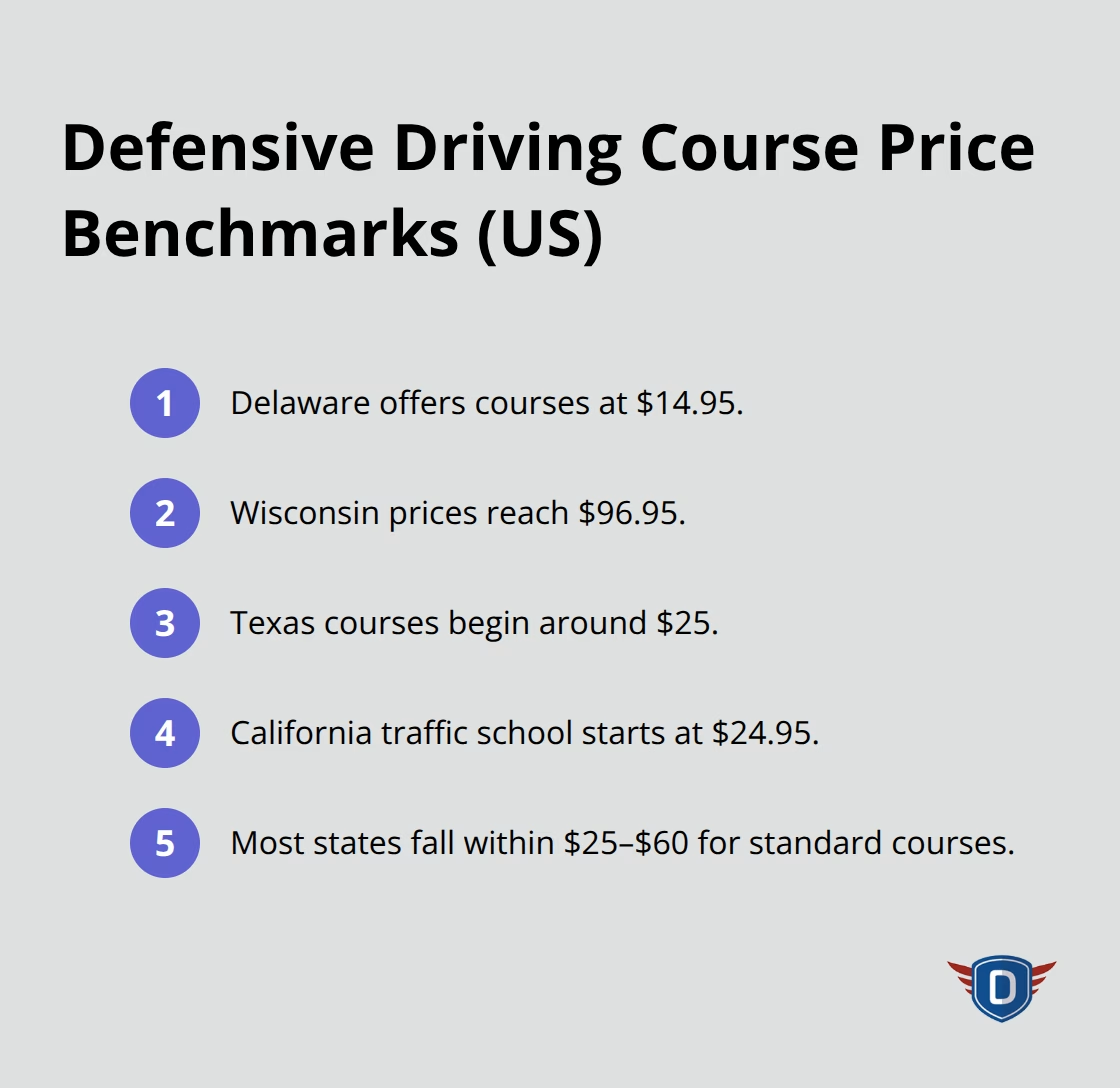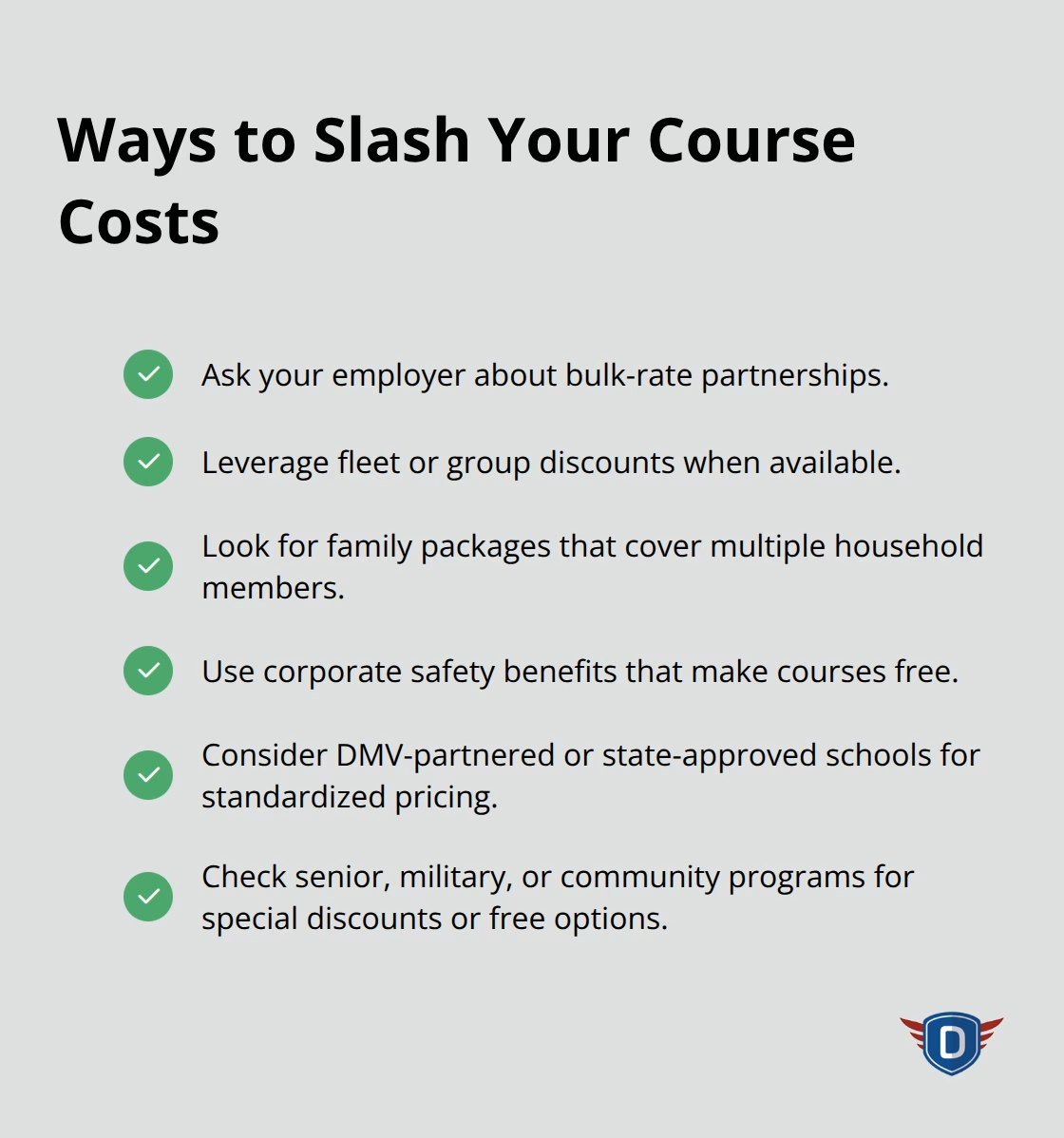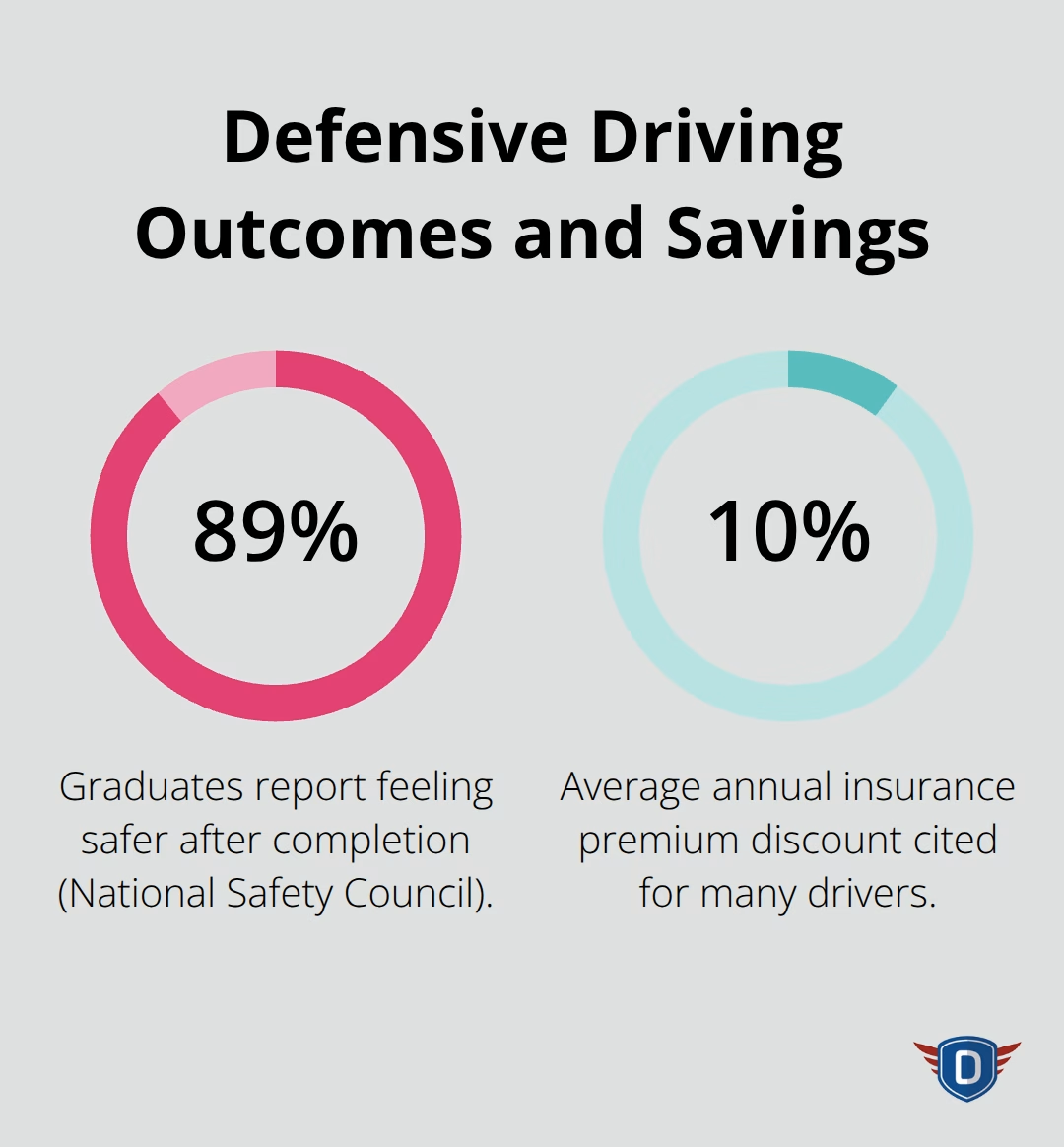Defensive driving courses typically cost between $15 and $100, depending on your state and delivery method. Online courses generally run cheaper than classroom sessions.
We at floridanewdriver.com know that understanding how much is a defensive driving course helps you budget for this valuable training. The investment often pays for itself through insurance discounts and ticket dismissal benefits.
What Do Defensive Driving Courses Actually Cost?
State prices vary dramatically across the country. Delaware offers the most affordable options at $14.95, while Wisconsin commands premium prices that reach $96.95. Texas maintains competitive rates with courses that begin around $25, and California’s popular traffic school programs start at $24.95.

Online Courses Are Usually Cheaper Than Classroom Sessions
Online defensive driving courses consistently cost less than in-person alternatives. A defensive driving class can range from $15 to $150, with online courses usually cheaper while in-person classes cost more. Digital programs eliminate travel expenses, parking fees, and lost wages from missed work. The self-paced nature of digital courses adds tremendous value for busy professionals who can complete modules during lunch breaks or evening hours.
Hidden Fees Add $5 to $10 to Your Base Price
Processing fees and certificate mailing charges increase your base course price. Some providers advertise low headline prices but stack additional costs during checkout. Course duration significantly impacts price, with standard 4-hour programs that cost less than comprehensive 8-hour sessions. Instructor credentials and specialized content also influence fees, as certified professionals with advanced training command higher rates (especially those with specialized safety certifications).
Course Length Determines Your Investment
Standard 4-hour courses represent the minimum requirement in most states and offer the lowest price point. Extended 8-hour programs provide more comprehensive content but double your investment. Some states mandate specific hour requirements, while others allow flexibility in course selection. Professional drivers often choose longer courses for career advancement benefits (which employers frequently value).
The next step involves understanding how various discount programs can reduce these costs significantly.
How Can You Slash Your Course Costs
Smart drivers know that defensive driving courses don’t have to break the bank. Several proven strategies can cut your expenses by 20-50% or even eliminate costs entirely.
State Programs Offer the Biggest Savings
Many states sponsor reduced-price programs for specific driver groups. Texas provides court-approved courses that dismiss tickets while costing only the base fee, which eliminates fine payments that often exceed $200. California’s DMV partners with approved schools to offer traffic violator courses at standardized rates, which prevents price gouging. Senior drivers aged 50 and above qualify for AARP Smart Driver discounts in most states, with courses priced around $15-20 for members. Military personnel receive substantial discounts through base education centers, often paying just $10-15 for comprehensive programs. Low-income drivers can access free courses through community colleges and nonprofit organizations in states like Florida and New York.
Group Rates Cut Individual Costs
Employers often negotiate bulk rates for their drivers, which reduces per-person costs by 30-40%. Fleet companies regularly secure group discounts that bring course prices down to $15-25 per employee. Some driving schools offer family packages that cover multiple household members at reduced rates. Corporate safety programs frequently include defensive driving as a benefit, which makes courses free for participating employees.

Insurance Companies Pay You Back
Most major insurers reimburse course fees after completion, which makes your investment essentially free. GEICO offers defensive driver discounts with eligibility varying based on specific factors and state requirements. State Farm covers the full cost for drivers who maintain clean records. Progressive offers immediate premium reductions that exceed course costs within the first year. Allstate provides reimbursement checks within 30 days of certificate submission. The key lies in contacting your insurance agent before enrollment to confirm eligibility and approved providers (some insurers require pre-approval while others accept any state-certified course).
These savings strategies work best when you understand exactly what features and benefits different courses provide for your specific needs.
Which Course Offers the Best Value for Your Money
Course selection requires you to examine specific features that directly impact your experience and long-term benefits. The National Safety Council reports that 89% of defensive driving course graduates feel safer after completion, but this statistic masks huge quality differences between providers. Premium courses include interactive simulations, personalized feedback systems, and comprehensive accident analysis modules that basic programs skip entirely.

Instructor Credentials Matter More Than Price
Certified instructors with specialized safety credentials command higher fees but deliver superior education quality. Look for courses taught by former law enforcement officers, professional drivers with CDL experience, or safety specialists certified by recognized organizations. AARP Smart Driver instructors undergo rigorous training and maintain 4.3 out of 5 ratings for course value according to participant surveys. Avoid courses with generic instructors who lack specific traffic safety backgrounds. The best programs feature instructors with accident reconstruction experience or fleet safety management credentials, as these professionals understand real-world challenges better than standard educators.
Course Fees Should Include Everything You Need
Hidden costs destroy budget plans, so examine what each fee covers before enrollment. Complete packages include course materials, certificate processing, state fees, and unlimited access to course content. Texas Defensive Driving courses that cost $25 often exclude $10 certificate mailing fees and $5 processing charges (which brings actual costs to $40). Premium providers like the National Safety Council include everything in their base price, which eliminates surprise charges. Mobile-friendly platforms with offline content access justify higher fees through convenience and flexibility. Courses with lifetime access to materials provide ongoing reference value that single-use programs cannot match.
Technology Features Separate Good Courses from Great Ones
Modern defensive driving courses use advanced technology to enhance learning outcomes. Interactive video scenarios test your decision-making skills in real traffic situations, while basic courses rely on static presentations. Progress tracking systems show your strengths and weaknesses throughout the course, which helps you focus on areas that need improvement. Mobile apps allow you to complete modules during commutes or breaks (making course completion more convenient). Some providers offer virtual reality components that simulate dangerous driving conditions without actual risk.
Final Thoughts
Defensive driving course costs range from $14.95 in Delaware to $96.95 in Wisconsin, with most states that charge $25-60. Online programs consistently cost less than classroom sessions, though hidden fees can add $5-10 to your base price. The question of how much is a defensive driving course becomes less important when you consider the financial returns.
Smart shoppers target state-approved discount programs, group rates, and insurance reimbursement options that often eliminate costs entirely. GEICO, State Farm, and Progressive frequently reimburse full course fees while they provide ongoing premium discounts that average 10% annually. This translates to $170 in yearly savings for most drivers (which makes the initial investment worthwhile).
Quality matters more than price when you select courses. Look for certified instructors with law enforcement or fleet safety backgrounds, comprehensive course materials, and modern technology features like interactive simulations. We at floridanewdriver.com help drivers find quality defensive driving education that creates benefits beyond immediate savings.







